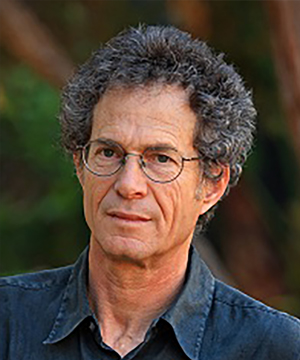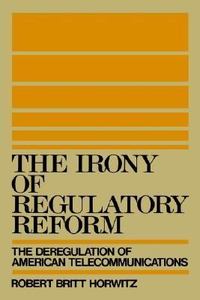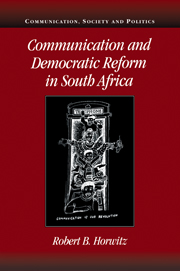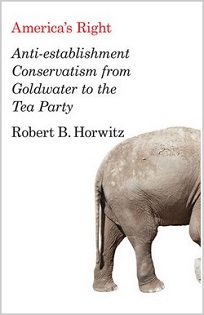
- rhorwitz@ucsd.edu
- (858) 534-9981
-
9500 Gilman Dr
Office: MCC 209
La Jolla , California 92093
Professor Emeritus, Professor of Graduate Division.

I have been interested in democracy, the state, communication, and political reform.

My first book, The Irony of Regulatory Reform: The Deregulation of American Telecommunications (Oxford 1989), examined these themes by studying the rise of regulatory agencies in American history, and by taking a detailed look at how the Federal Communications Commission regulated broadcast and telephone industries over a 60 year period. The ultimate aim of the book was to understand how the deregulation of US communications came about in the 1980s. The "ironies" referred to in the book's title point to the complexity of the process of regulatory reform and the paradoxes of its political outcomes. For example, while conservative anti-regulation rhetoric was aimed at the so-called social regulatory agencies such as the Environmental Protection Agency and Occupational Safety and Health Administration, in practice it was the economic regulatory agencies such as the Interstate Commerce Commission and FCC that deregulated, often with vehement opposition from the industries they regulated. Yet these were the very agencies that most observers claimed had been captured by the industries they regulated. And liberals, attacking the economic regulatory agencies as captured and corrupt, uncharacteristically supported deregulation as a way to crack open what they perceived as sets of closed cartels. A synopsis of the argument can be found in a talk I gave in 1998 called "Deregulation as a Political Process."
 My second book, Communication and Democratic Reform in South Africa (Cambridge 2001), looks at the transition from apartheid to democracy in South Africa through the lens of the reform of the communications sector. The book examines the transformation of South African broadcasting, telecommunications, the print press, and state information service from apartheid institutions into democratic institutions accountable to the new democratic public. The actual reforms more or less conform to accepted contemporary international models. What was innovative in South Africa was the reform process. In many, if not most, countries, communication policy reform has been pushed by political and economic elites, whose ability to bring about policy transformation derives largely from the insulation of "reform" from normal political decision-making channels and distributive claims. In marked contrast, communications policy reform in South Africa was conducted within a democratizing context and was itself a democratic process of a unique, participatory kind. The reform processes entailed a transparent and consultative form of stakeholder politics, which derived from the participatory, grassroots politics of the United Democratic Front period of the 1980s. In so doing, the South African communications policy reform processes constructed a genuine public sphere in which all relevant parties had access and the ability to participate in ongoing discussions and negotiations in substantive, rather than merely symbolic ways. These were instances of negotiations among civil society stakeholders and between civil society and the state over the shape of a new political economy, where consensus building would have normative force for the participants. The inevitable tension between participatory and electoral politics was, in these instances, generally productive in creating viable and legitimate policy reforms in a kind of negotiated liberalization of economic institutions. Preface and table of contents and first 10 pages of the first chapter
My second book, Communication and Democratic Reform in South Africa (Cambridge 2001), looks at the transition from apartheid to democracy in South Africa through the lens of the reform of the communications sector. The book examines the transformation of South African broadcasting, telecommunications, the print press, and state information service from apartheid institutions into democratic institutions accountable to the new democratic public. The actual reforms more or less conform to accepted contemporary international models. What was innovative in South Africa was the reform process. In many, if not most, countries, communication policy reform has been pushed by political and economic elites, whose ability to bring about policy transformation derives largely from the insulation of "reform" from normal political decision-making channels and distributive claims. In marked contrast, communications policy reform in South Africa was conducted within a democratizing context and was itself a democratic process of a unique, participatory kind. The reform processes entailed a transparent and consultative form of stakeholder politics, which derived from the participatory, grassroots politics of the United Democratic Front period of the 1980s. In so doing, the South African communications policy reform processes constructed a genuine public sphere in which all relevant parties had access and the ability to participate in ongoing discussions and negotiations in substantive, rather than merely symbolic ways. These were instances of negotiations among civil society stakeholders and between civil society and the state over the shape of a new political economy, where consensus building would have normative force for the participants. The inevitable tension between participatory and electoral politics was, in these instances, generally productive in creating viable and legitimate policy reforms in a kind of negotiated liberalization of economic institutions. Preface and table of contents and first 10 pages of the first chapter
 My third book is America’s Right: Anti-establishment Conservatism from Goldwater to the Tea Party (Polity 2013). It examines the rise of the particular form of American conservatism that has captured the Republican Party and seized the political agenda in the form of the Tea Party movement. Published three years before the victory of Donald Trump, America’s Right anticipates Trumpism and explains its roots. Conservatism has been the most important political doctrine in the United States for nearly four decades. It has dominated the intellectual debate and largely set the policy agenda, even during years of Democratic electoral control. But this is a particular kind of conservatism, one focused not just on familiar topics of conservative concern as government spending and taxes and personal morality, but one anxious and angry about the purported homosexual agenda, the hoax of climate change, the rule by experts and elites, Barack Obama’s secret Muslim identity. I call this anti-establishment conservatism, whose origin can be found in the faction of the right wing that battled both Democrats and moderate Republicans in the post-World War II period. Reengaging the work of the historian Richard Hofstadter and his concept of the paranoid style in American politics, America’s Right examines the nature of anti-establishment conservatism, traces its development from the 1950s to the present, and explains its political ascendance.
My third book is America’s Right: Anti-establishment Conservatism from Goldwater to the Tea Party (Polity 2013). It examines the rise of the particular form of American conservatism that has captured the Republican Party and seized the political agenda in the form of the Tea Party movement. Published three years before the victory of Donald Trump, America’s Right anticipates Trumpism and explains its roots. Conservatism has been the most important political doctrine in the United States for nearly four decades. It has dominated the intellectual debate and largely set the policy agenda, even during years of Democratic electoral control. But this is a particular kind of conservatism, one focused not just on familiar topics of conservative concern as government spending and taxes and personal morality, but one anxious and angry about the purported homosexual agenda, the hoax of climate change, the rule by experts and elites, Barack Obama’s secret Muslim identity. I call this anti-establishment conservatism, whose origin can be found in the faction of the right wing that battled both Democrats and moderate Republicans in the post-World War II period. Reengaging the work of the historian Richard Hofstadter and his concept of the paranoid style in American politics, America’s Right examines the nature of anti-establishment conservatism, traces its development from the 1950s to the present, and explains its political ascendance.
The introductory chapter is available for reading.
I also have an abiding interest in American free speech and communication law, and have published a number of essays in this area, several of which are listed under Selected Publications.
Ph.D. in Sociology, Brandeis University (1982)
A.B. in Social Thought and Institutions, Stanford University (1974)